Bridging the Skills Gap: Insights and Recommendations for Updating Medical Biotechnology Master's Curriculum in Iran
-
Ahmadieh-Yazdi , Amirhossein
-
Department of Medical Biotechnology, School of Advanced Medical Sciences and Technologies, Hamadan University of Medical Sciences, Hamadan, Iran
-
Imani , Behzad
-
Department of Operating Room, School of Paramedicine, Hamadan University of Medical Sciences, Hamadan, Iran
-
Jalali, Akram
-
Department of Medical Biotechnology, School of Advanced Medical Sciences and Technologies, Hamadan University of Medical Sciences, Hamadan, Iran
-
Research Center for Molecular Medicine, Institute of Cancer, Avicenna Health Research Institute, Hamadan University of Medical Sciences, Hamadan, Iran
-
Piryaei, Fahimeh
-
Research Center for Molecular Medicine, Institute of Cancer, Avicenna Health Research Institute, Hamadan University of Medical Sciences, Hamadan, Iran
-
Department of Medical Genetics, School of Medicine, Hamadan University of Medical Sciences, Hamadan, Iran
-
 Dalirfardouei, Razieh
Department of Medical Biotechnology, School of New Sciences and Technologies in Medicine, Pardis Campus, Hamadan University of Medical Sciences, Hamadan, Iran, Tel: +98 11 35305252; Fax: +98 11 35302450; E-mail: dalir_r@yahoo.com, r.dalir@umsha.ac.ir
Dalirfardouei, Razieh
Department of Medical Biotechnology, School of New Sciences and Technologies in Medicine, Pardis Campus, Hamadan University of Medical Sciences, Hamadan, Iran, Tel: +98 11 35305252; Fax: +98 11 35302450; E-mail: dalir_r@yahoo.com, r.dalir@umsha.ac.ir
-
Research Center for Molecular Medicine, Institute of Cancer, Avicenna Health Research Institute, Hamadan University of Medical Sciences, Hamadan, Iran
Abstract: Background: Biotechnology is a rapidly developing field, and Iran aims to enhance its position in biosimilars through improved educational frameworks. Successful nations, such as the U.S., UK, Switzerland, China, and India, exemplify the positive impact of targeted educational programs in producing skilled graduates who advance the biotech sector. Research indicates a significant connection between curriculum relevance and graduate employability, suggesting that comprehensive curriculum assessment and reform can enhance student success and faculty involvement. This study investigated the necessity of revising the Master's curriculum in Medical Biotechnology in Iran to align with industry demands and global advancements.
Methods: The current curriculum's effectiveness using the Delphi method was assessed to survey Master's students, professors, and industry stakeholders.
Results: Findings revealed that while the current curriculum moderately aligns with educational objectives, significant gaps exist in practical training and resource availability. Many students reported feeling inadequately prepared for employment, particularly in essential skills such as animal cell culture, vaccine and monoclonal antibody design and production, and human skills like effective communication and teamwork. To address these deficiencies, some new courses focusing on practical experience and interdisciplinary approaches were recommended. Recommendations included enhancing laboratory facilities, integrating internships, and adopting team-based learning methods to improve student engagement and skill acquisition.
Conclusion: Continuous investment in biotechnology education is crucial for maintaining competitive advantages in a globalized market. Overall, this research highlighted the importance of adapting educational programs to meet the dynamic needs of the biotechnology industry, ensuring graduates possess the necessary skills for successful careers in this field.
Introduction :
Biotechnology is a multidisciplinary collaboration among academia, industry, and government that can potentially address health challenges and contribute to economic growth. It offers eco-efficient solutions for industrial bio-products and processes, promoting sustainable production methods across various sectors 1. Valued at over $300 billion, the biotechnology sector is essential for achieving sustainable development goals and fostering inclusive industrial growth 2. The U.S. leads globally with over 2,840 biotech companies, followed closely by the UK with nearly 2,800 firms, both enhancing their innovation capacities 3. Additionally, countries like Brazil, China, Cuba, Egypt, India, South Africa, and South Korea are advancing in health biotechnology by enhancing their scientific and technological infrastructures 4. China alone is expected to account for 22% of the global biotech market by 2032, driven by rising healthcare expenditures and robust government support for R&D 5. Iran has initiated biotechnology medicine production, aiming to become a key player in Asia's biosimilars market. The country ranks 12th globally in scientific articles on biotechnology and leads West Asia in research and product development 6. Supportive policies, the involvement of decision-makers, and the development of human resources are critical factors in advancing the medical biotechnology industry 7. The availability of well-trained scientists and technicians is seen as a key advantage. Iran's concerted efforts to build a robust biotechnology innovation system through institutional development, policy support, and leveraging its human resources 8. Therefore, effective educational programs must address both theoretical and practical aspects of biotechnology, including business, intellectual property, and regulatory frameworks 9.
The professional Master’s program in biotechnology should be designed to equip students with essential skills in biotechnology, business management, and regulatory knowledge, addressing the critical need for professionals who can effectively translate research into practical applications 9. The educational landscape supports biotechnology growth through programs emphasizing practical skills and research. Institutions like the University of Aberdeen, RMIT University, Stanford University, University of Westminster, and Johns Hopkins University provide specialized curricula that prepare graduates for careers in this expanding field 10-14. Graduates often contribute to research addressing local health and environmental issues, thereby enhancing employability and driving innovation 15. For instance, RMIT University's Master of Biotechnology focuses on real-world applications via project work and industry placements, significantly impacting the sector's advancement. Educational awareness is crucial for preparing students to understand and engage with biotechnological advancements. Enhancing educational awareness in this field is essential not only for student knowledge but also for the broader societal understanding of biotechnology's implications in health, medicine, and industry. Chidobi et al proposed several strategies to improve awareness, including curriculum modifications and increased teacher training in biotechnology 16. Moreover, biotechnology education programs should focus on developing practical skills in areas like project management, finance, and industry collaboration to effectively prepare students for careers in the biotechnology sector 17.
In Iran, the latest educational program for Medical Biotechnology was updated in 2012 18 (more than 10 years ago); while medical biotechnology is rapidly evolving necessitating a critical examination and revision of the curriculum for Master's degree programs to ensure they meet both national requirements and the latest global advancements. As the biotechnology sector continues to expand, driven by innovations in areas such as gene editing, personalized medicine, and biopharmaceutical development, educational institutions must adapt their curricula to meet the evolving needs of the industry and prepare graduates for the complexities of this dynamic field. Curriculum mapping is a vital process that allows for the assessment of learning outcomes and the detection of redundancies, ultimately enhancing student achievement and faculty involvement 19. Effective educational research highlights the importance of integrating interdisciplinary approaches that encompass molecular biology, bioinformatics, and regulatory affairs within the Master’s program in Medical Biotechnology. Additionally, the curriculum must address emerging trends and technologies reshaping the biotechnology landscape. This includes a focus on bioethics, sustainability, and the commercialization of biotechnological innovations. For instance, the curriculum at the University of Illinois, Chicago incorporates essential topics such as biotechnology product development, regulatory issues, and applied medical biotechnology, reflecting the critical competencies required in the workforce 20. Similarly, programs such as the Medical and Pharmaceutical Biotechnology master's degree at IMC Krems emphasize an interdisciplinary mindset and a strong practical focus, ensuring that students are well-prepared to meet industry needs through hands-on laboratory experiences and exposure to current trends in biopharmaceuticals and biotechnology applications 21. Edinburgh Napier University highlights the importance of business and entrepreneurship, preparing students to navigate the commercial aspects of biotechnology alongside scientific inquiry 22. Therefore, in this study the Master’s curriculum was comprehensively reviewed using the Delphi method to identify gaps and redundancies, ensuring that the program aligns with the evolving demands of the global market fosters a culture of innovation, and effectively prepares graduates for the complexities of modern biotechnology environments.
Materials and Methods :
Participants: To evaluate how well the current curriculum prepares students for industry and future careers, a survey involving Master's students and professors was conducted. The study focused on graduates or second-year Master's students specializing in Medical Biotechnology, who had defined their thesis topics and were enrolled in various public universities across Iran. Additionally, professors from different institutions who taught medical biotechnology were included. To better understand industry needs, commercial companies were also surveyed. The eligibility criteria for participation are summarized in table 1. Participants were contacted through email and SMS, and informed consent was obtained from each individual before their involvement. The sampling method was purposive non-probability which recruited eligible participants including professors, students/graduates, and industrial stakeholders across various universities with different ranges of academic standings and rankings located in both small towns and larger metropolitan areas 23,24. Out of 65 invited participants, 42 completed the questionnaire, resulting in a non-participation rate of 28%. Figure 1 illustrates an overview of the universities affiliated with professors and students/graduates, alongside a depiction of the company's field of specialization.
Questionnaire design: The questionnaire comprised 50 items aimed at evaluating the effectiveness of the current curriculum regarding to its objectives, skills, and content. Additionally, it was designed to assess the educational needs and to determine the necessity of curriculum revision. This instrument incorporated both closed-ended and open-ended questions to elicit qualitative insights. An initial draft of the questionnaire underwent pilot testing with a cohort of seven experts, including faculty members and industry stakeholders. The feedback obtained from this pilot study prompted revisions to enhance clarity and relevance.
Data collection and analysis: The questionnaire was administered online using Porsline (https://survey.porsline.ir). Data collection took place over four months from September 1, 2023, to January 30, 2024. The follow-up reminders were effective in increasing participation who had not yet completed the survey. In this research, the Delphi method which harnessed the opinions and experiences of participating expertise who acted as panel members was employed to investigate three components: the objectives, acquired skills, and content of the Master's program in Medical Biotechnology. Initially, these elements were assessed through a questionnaire, followed by an in-depth analysis. Subsequently, specialists in the field were engaged in face-to-face discussions and group dialogues to further explore and evaluate these components.
Data were analyzed using the SPSS software. Descriptive statistics were calculated for demographic variables and questionnaire responses. Inferential statistics, including t-tests and ANOVA, were conducted to examine differences in well-being scores based on demographic factors.
Ethical considerations: Participant confidentiality was maintained by anonymizing responses and securely storing data in a password-protected database. All participants were informed of their right to withdraw from the study at any time without any consequences.
Results :
Demographic data of all participants: In this study, twelve professors from various universities in Iran, including Hamadan, Mashhad, Shahrekord, Iran, and Fasa University of Medical Sciences participated, with approximately 67% of them being male (Figure 1A). About 75% of the participating faculty members have over five years of teaching experience (Table 2). Additionally, a total of 19 master's degree students in medical biotechnology from different universities across the country, including Tarbiat Modares University, Hamadan, Iran, Tabriz, and Isfahan University of Medical Sciences, as well as the Iranian Blood Transfusion Organization responded to the questionnaire (Figure 1B). Less than half of the employed students hold jobs related to their field of study (31.6%), and only 10.5% are working in knowledge-based companies (Table 2). Furthermore, eleven different commercial companies, approximately 82% of which are knowledge-based, participated in this study to evaluate the skills required for attracting skilled personnel and to incorporate these skills into the curriculum (Table 2).
Alignment of course objectives with current curriculum goals: The alignment of course objectives with the overall goals of the current program from the university professors' and students'/graduates' points of view is presented in figure 2A. Both students/graduates and professors expressed that the existing curriculum content provides a moderate level of essential and specialized concepts relevant to the field. However, students/ graduates expressed concerns that these topics are not presented practically during classes (Figures 2B and 2C). Additionally, both groups indicated that laboratory practical classes are delivered slightly effectively and appropriate for achieving the program's objectives (Figure 3A). In terms of laboratory infrastructure and institutional resources, such as access to appropriate informational resources (including internet, libraries, journals, and databases) and adequately equipped laboratories, both groups have rated these aspects from poor to average (Figures 3B and 3C). This suggests a significant gap in the resources necessary to support effective teaching and learning within the program.
Relationship between acquired skills based on the current curriculum and employment requirements: To investigate the relationship between the skills, knowledge, and information that students acquire during their Master's program by passing both major-specialized and optional-compensatory courses and the skills necessary for their employment, questions were responded to by both professors and students/graduates’ groups.
As shown in table 3A, from the perspective of students/graduates, the most relevant course among the core-specialized courses is "Practical Genetic Engineering", whose content is completely related to the biotechnology field and has been rated as satisfactory (63% of students/graduates chose rank 1). This is followed by "Principles of Working with Laboratory Animals" with 47% in second place. However, from the professor's point of view, "Theoretical Genetic Engineering" and "Principles of Working with Laboratory Animals", with approximately 74% of the votes, are the most relevant course units, and the content presented has been described as completely satisfactory.
Both professors and students/graduates’ groups indicated that the content provided in the course "Medical Biochemistry" does not adequately meet professional needs. Additionally, they expressed that the course on "Medical Genetics" is not relevant to their field of study and should be replaced with another course (Table 3A).
Among the optional-compensatory courses as illustrated in table 3B, students and graduates perceive that the courses on "Animal Cell Culture", "Seminar 2", and "Research Methodology" have the strongest alignment with the objectives of the biotechnology program with the content provided being entirely satisfactory. In agreement with this perspective, professors have also identified "Animal Cell Culture", "Seminar 2", "Principles of Economics and Intellectual Property", and "Biosafety, Ethics, and Law" as the most relevant educational units related to the goals of this field, noting that the content provided is fully satisfactory.
According to the data presented in table 3B, from the student's/graduates' point of view, certain courses such as "Biosafety, Ethics, and Law", "Research Methodology", and "Medical Informatics Systems" do not adequately address their professional needs. Additionally, the content of the "Nanobiotechnology" course requires updating and revising. However, from the professor's point of view, the "Specialized English Language" course does not meet professional needs, and the syllabus of the "Pathobiology" course should be revised and updated.
Generally, the findings revealed that the trainees' skills in both Collaboration and Independent conduct of research projects were average according to the assessments of the two groups involved (students and professors). However, the trainees' skills in collaborating in the registration of inventions or conducting them independently were found to be below average or at an average level. The results showed that while students effectively learned animal lab skills and PCR techniques, the current curriculum did not adequately prepare them for initial techniques in vaccine and monoclonal antibody production (Table 4). Students/graduates indicated that their competencies and skills in animal cell culture, stem cell isolation and characterization, and in silico analysis did not fulfill the requirements necessary for employment (Table 4).
To modify the curriculum for the Master's degree in Medical Biotechnology, six courses were proposed, and their relevance to the program's objectives and employment opportunities was assessed. The suggested courses include "Application of stem cells and Introduction to tissue engineering", "Microbiology for Biotechnologist", "Introduction to a Programming Language", "Internship (three months, during the first summer term)", "Industrial Biotechnology (principles of fermenters and industrial-scale production, with a practical unit in the form of an internship)", "Academic specialized language (intensive six-month course)". This proposed curriculum aims to enhance the educational framework and better prepare graduates for the job market.
More than 50% of students/graduates considered all six proposed courses to be highly relevant to their field of study and satisfactory. Both professors and students/graduates believe that "application of stem cells and Introduction to tissue engineering" and "internship (three months, during the first summer session)" will meet employers' needs and significantly contribute to the employment of learners (Figures 4A and 4B). Figure 5 outlines the key requirements identified by employers and industry leaders. The most in-demand skills in the job market, particularly within manufacturing, include proficiency in operating various devices and equipment, as well as mastering calibration techniques. Additionally, essential wet lab skills in molecular and cellular techniques—such as PCR, electrophoresis, and the cultivation of animal and bacterial cells (both industrial and lab scale) should be integrated into the curriculum of this academic program (Figure 5A). In the context of dry lab skills, employers have demonstrated a particular preference for proficiency in primer and probe design and expertise in big data analysis (Figure 5B). Moreover, social and communication skills are recognized as essential competencies, alongside individual attributes such as proficiency in foreign languages and report writing, considered highly beneficial for professional advancement (Figure 5C).
Discussion :
Effective curriculum revision is essential for aligning educational programs with the evolving needs of society and the job market. Universities and higher education institutions play critical roles in the curriculum revision process to prepare students for the evolving demands of the 21st-century workplace 25,26. For the revision process, collaboration among academic staff, educational developers, and administrative bodies is vital for successful implementation. There are challenges faced by universities, such as bureaucratic hurdles and the need for more comprehensive engagement from stakeholders, to ensure that curricula remain relevant and effective in fostering student learning and employability 25. Universities in Asia must augment their teaching programs by incorporating skill-based education into the curriculum 26. Moreover, the results of this study indicated the majority of respondents (more than 64%) felt that the current courses and curriculum are moderately aligned with the objectives of this major/degree (Figure 2). Therefore, it is essential to review and reform the university curriculum in Iran to create sustainable pathways for graduate careers, which is a key mission of the higher education system. The aim of the study was consequently to investigate the necessity of reviewing and reforming the curriculum of the Master's degree program in Medical Biotechnology.
Considering the research-oriented nature of Medical Biotechnology, one of the fundamental requirements enhancing the skills and knowledge of learners is the availability of modern- and state-of-the-art laboratories which is in line with skills and competencies stated by manufacturing stakeholders including proficiency in operating relevant tools and equipment, the ability to calibrate devices, and the careful handling and protection of utilized equipment and resources that company owners heavily prioritized when recruiting skilled labor. Nevertheless, over half of students/graduates reported that the laboratory facilities at their educational institution are below average (Figure 2), and approximately 66% of professors indicated that university laboratory facilities are at an average level or below. Therefore, it is recommended as a fundamental and vital measure that the laboratories at universities be adequately equipped. This enhancement is expected to significantly improve students' skills and competencies.
As proposed by Bridge D. 26, the present study findings indicated that one of the most essential skills sought by employers is human skills including effective communication, interpersonal interaction, and the ability to perform assigned tasks within the workplace (Figure 5A). To enhance human skills, it is recommended that a team-based learning method and a three-month internship in a relevant industrial center, which has been identified as a need by more than 90% of both professors and students/graduates (Figure 4), provide students with practical experience and competencies valued by potential employers.
A strong interesting skill among employers is expertise in animal cell culture, both at laboratory and industrial scales, as well as in large-scale bacterial cell culture. Approximately two-thirds of the professors (66%) reported that students acquire these skills at a high or very high level upon completing their courses. Surprisingly, however, students/graduates felt that their ability to perform animal cell culture was below average. The primary cause of this discrepancy is the high cost of the techniques involved. Consequently, students have often been unable to learn practical and foundational cell culture techniques independently. While the majority of respondents acknowledged the relevance of the "animal cell culture" course to the program's aims, they also suggested revisions to its content. Currently, this course is structured as a 2-credit (theoretical-practical) class; however, it is recommended that it be offered as a purely practical 2-credit course. This change could lead to enhanced skill acquisition and increased satisfaction among learners by the end of the program.
Practical skills in PCR (Polymerase Chain Reaction), electrophoresis, and the evaluation and interpretation of results are considered essential by employers. The overall response to the question demonstrated a high level of satisfaction with the learner's ability in these techniques. It is recommended that the course curriculum regarding this topic remain unchanged compared to the previous approach.
The present study findings unexpectedly revealed that vaccine production, design, and big data analysis -key global topics especially after the widespread global outbreak of the coronavirus- have not yet been widely adopted by manufacturing companies in Iran. Given the expert opinion in biotechnology and the need for diverse vaccine production platforms in the post-COVID era, it is recommended that foundational vaccine production techniques be taught to master's students. However, since the master's program is of short duration, practical training in vaccine production may be better suited for doctoral students, who have more time for education and research, as well as larger thesis budgets.
Conclusion :
The study aims to provide decision-makers with evidence-based recommendations to adapt the educational program in Medical Biotechnology and ensure graduates are equipped with the necessary skills for successful careers in this rapidly evolving field. The findings indicated that revising the Master's curriculum in Medical Biotechnology is an undeniable necessity to align with global advancements and the needs of employers and relevant industry companies. Furthermore, the availability of well-equipped laboratories with modern facilities in universities and institutions is crucial for enhancing students' skills and employability. Introducing a three-month internship during the first summer session, following the completion of theoretical courses, or alongside the thesis at relevant industrial, production, or research centers will significantly contribute to developing communication skills and interaction in the workplace.
To further enhance learners’ skills and capabilities, it is recommended that course content and syllabi be delivered through team-based learning methods. Moreover, "animal cell culture" should be offered as a purely practical 2-credit course; currently, this unit is presented in a theoretical/and practical format. Moreover, a six-month intensive English language course is highly recommended to enhance learners' skills in international communication and deepen their understanding of foundational and contemporary concepts.
Strengths and limitations: This study is the first of its kind in Iran, surveying employers and industrial stakeholders to review, organize, and reform the curriculum. One of the study’s most significant strengths is its identification of the critical link between unemployment and the lack of relevant job opportunities for university graduates. By implementing the results and recommendations from this research, there is the potential to enhance employment prospects for graduates of the Master’s program in Medical Biotechnology by aligning their skills with industry demands. Another notable strength of this study is the design of an electronic questionnaire supplemented by follow-up SMS messages to encourage participation. This method enabled the distribution of the questionnaire to more remote cities, including Fasa, Tabriz, and Mashhad. In addition, the number of questions in the questionnaire was optimized allowing respondents to complete it in a brief period, typically between 15 to 20 min. This efficiency significantly motivated eligible individuals to participate in the study. However, as this research is a pilot study, one limitation that may impact its robustness is the sample size. Therefore, it is recommended that collaboration be established with the Ministry of Health and Medical Education, the Biotechnology Board, and the Educational Deputy of universities nationwide to effectively implement the findings of this study.
Acknowledgement :
This project was financially supported by Hamadan University of Medical Sciences under project number 140109017408 and ethical approval number IR.UMSHA.REC.1401.503. We also appreciate the participation of all study participants.
Conflict of Interest :
Authors declare no conflict of interest.
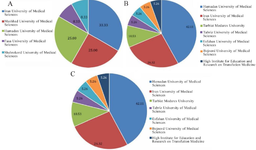
Figure 1. Overview of the universities affiliated with (A) professors and (B) students/graduates, as well as (C) a depiction of the company's field of activity.
|
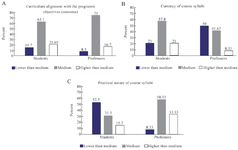
Figure 2. The relationship between the overall objectives of curriculum and education programs.
|
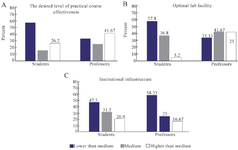
Figure 3. Students’/graduates’ and professors’ satisfaction with practical courses and their attitude regarding (A) the desired level of practical course effectiveness, (B) optimal lab facility, and (C) institutional infrastructure.
|
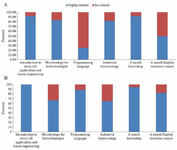
Figure 4. The relevance of suggested new courses with the Master’s Medical Biotechnology objectives as well as the needs of employees from students/graduates (A) and professors (B) point of view.
|

Figure 5. In-demand skill sets and competency areas for a career. (A) Wet laboratory skills, (B) Dry laboratory skills, (C) Individual attributes.
|

Table 1. Eligibility criteria for all participants (students, graduates, professors, and commercial stakeholders) in this study
|

Table 2. Demographic data and detailed information of participants including professors, students/graduates, and industrial stakeholders
|
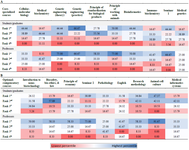
Table 3. Alignment of (A) core-specialized course syllabi and (B) Optional-compensatory course content with overall goals of the Master’s academia program
|
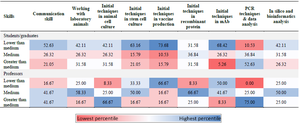
Table 4. Ranking the expected competencies and skills required for employment based on the current curriculum. The color indicates each cell value range. mAb, monoclonal antibody; PCR, polymerase chain reaction
|
|